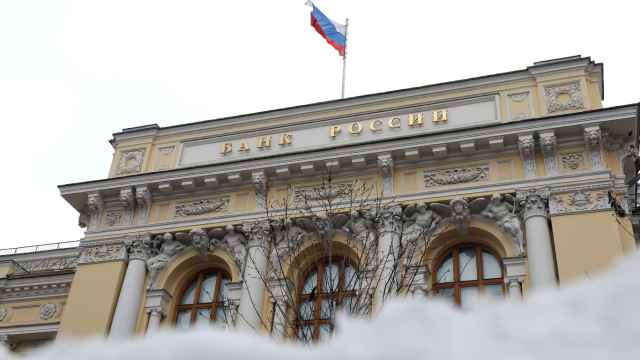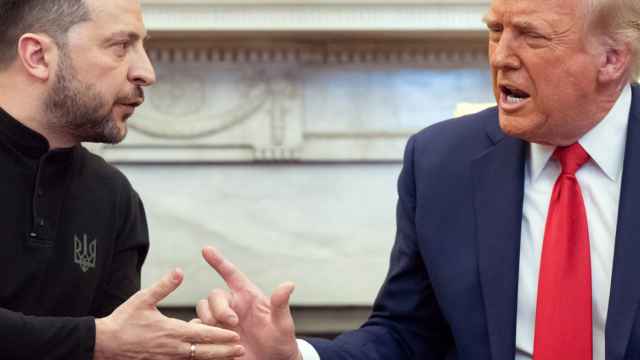President Dmitry Medvedev’s decision to fire Moscow’s long-entrenched mayor, Yury Luzhkov, is the most decisive move he has made in his presidency. Is it really part of his drive to modernize Russia, or part of an emerging power play with Moscow’s real strongman, Prime Minister Vladimir Putin?
Anatoly Chubais, the architect of Russia’s privatization in the 1990s and the current head of the country’s nanotechnology conglomerate, Rusnano, recently acknowledged that the prospects for political modernization in Russia are dim. “Today,” he said at an investors’ conference on Sept. 15, “no demand for it exists. Such demand requires a social group to promote it.”
Chubais went even further in a conversation with foreign investors, suggesting that the threat of fascism in Russia will grow to the point that “discussions about Putin and Medvedev, Medvedev or Putin, will pale in comparison.”
This gloomy view might be explained by the interest Chubais has in stopping the West from challenging Russia’s rulers for violating human rights and curtailing freedom. To avoid an even worse alternative, the argument goes, the United States and Europe should support the Putin-Medvedev tandem in the hope that they provide a stable and secure environment for investment.
Chubais, a one-time reformer, has now made a complete about-face. He is now totally complicit in the regime’s policies. Nevertheless, he is telling the truth.
Igor Yurgens, head of the Institute of Contemporary Development think tank and protege of Medvedev, seems to share Chubais’ opinion. During a news conference last month titled “What is Hampering Russia’s Modernization,” Yurgens suggested that Russians “are not citizens, but rather some sort of tribe” and that the archaic character of Russian society is not likely to change before 2050. (Russian politicians are always fond of assigning a due date for change. Soviet leader Nikita Khrushchev famously promised in 1957 that communism would be built in 20 years.)
But what is most important in Yurgens’ comments is a common perception that Russians are not ready to assume the responsibilities of citizenship. Once again, all the formulas for Western-type democracy depend on the will of an enlightened and benevolent tsar.
Medvedev is currently seeking to perform this role. Once he brings about truly modernizing reforms, people will supposedly follow willingly, forgetting centuries of serfdom, the dictatorship of the proletariat, the political chaos and economic free fall of the 1990s and the decade of Putin’s managed democracy. But neither Khrushchev, nor Soviet leader Mikhail Gorbachev nor President Boris Yeltsin were able to uproot Russia’s stubborn culture of indifference and subordination, precisely because they insisted on top-down change and expected that the Russian people would simply acquiesce en masse.
Will Medvedev succeed where all others have failed?
The scandal over Luzhkov’s incompetence in handling this summer’s deadly heat wave and wild fires is being portrayed as a split between the “modernizing” Medvedev and the “old guard” Putin.
Putin, on the other hand, has never been publicly critical of Luzhkov, despite the fact that their relationship has been strained over the past 10 years. After all, it was under Putin’s supervision that the mayor turned Moscow into a private fiefdom. With a city budget of almost $50 billion, Luzhkov encouraged architectural vandalism, did far too little to reduce the city’s horrendous traffic jams and saw his wife become the richest woman in Russia through her Moscow construction projects. To all of this, Putin never once said “boo” publicly.
Most analysts suggest that this visible disagreement between Putin and Medvedev over Luzhkov’s fate is a sign of a looming contest for the presidency in 2012. Luzhkov, after all, had been vocally critical of Medvedev, while praising Putin — purportedly an attempt to drive a wedge between the two.
In this scenario, Medvedev is trying to unmask Luzhkov as a corrupt and incompetent satrap and to use him as a scapegoat for Russia’s systemic inefficiency. This campaign is intended as a way for Medvedev to sway public opinion behind him and to make Putin appear out of touch. The problem, though, is that Medvedev, like Luzhkov, was also mostly invisible during the summer’s disastrous heat wave, whereas Putin was everywhere, even piloting a firefighting airplane over burning forests.
Since Putin stayed on the sidelines of the Luzhkov scandal and did not formally take sides over what would happen to the former mayor, had Medvedev’s campaign against Luzhkov failed, the president would have surely found himself without a job in 2012. He would be forced to join Russia’s pathetic opposition, which bears part of the blame for the country’s toxic political culture. The opposition — led by Boris Nemtsov, former leader of the now-defunct Union of Right Forces; Mikhail Kasyanov, a former prime minister; chess master Garry Kasparov; writer Eduard Limonov; and former State Duma Deputy Vladimir Ryzhkov — has no coherent message with which to win support or provide a credible alternative to the country’s current leadership. So the power elite fight among themselves because there is no one else to fight with.
Now with Medvedev showing what appears to be a backbone, the presidential election campaign is officially on the way. But the truth is that Russian elections won’t depend on who has been more displeased with Luzhkov. Russians who are dissatisfied with the system still have a limited choice: either support marginal, weak and discredited oppositional candidates or — hoping for modernization from the top — side with the very system they oppose.
There is nothing new in the mistrust of the masses expressed by people like Chubais or Yurgens or in Medvedev’s desire to impose modernization from the top. (Khrushchev’s “thaw” and Gorbachev’s perestroika happened the same way.) What is new, however, is the emergence of organized resistance to this failed paradigm.
Beyond the opposition, numerous nonpolitical public initiatives have sprung up in the past several years to protest specific government policies, leading inevitably to confrontation with the existing political order. To be sure, such initiatives have not become substantial, and the political opposition is constantly trying to appropriate them to make their own case more credible. But it is these people — motorists, volunteer environmentalists, pensioners and charitable-campaign organizers — rather than Russia’s politicians who represent the country’s best hope for modernization.
Nina Khrushcheva, author of “Imagining Nabokov: Russia Between Art and Politics,” teaches international affairs at The New School in New York and is senior fellow at the World Policy Institute. © Project Syndicate.
A Message from The Moscow Times:
Dear readers,
We are facing unprecedented challenges. Russia's Prosecutor General's Office has designated The Moscow Times as an "undesirable" organization, criminalizing our work and putting our staff at risk of prosecution. This follows our earlier unjust labeling as a "foreign agent."
These actions are direct attempts to silence independent journalism in Russia. The authorities claim our work "discredits the decisions of the Russian leadership." We see things differently: we strive to provide accurate, unbiased reporting on Russia.
We, the journalists of The Moscow Times, refuse to be silenced. But to continue our work, we need your help.
Your support, no matter how small, makes a world of difference. If you can, please support us monthly starting from just $2. It's quick to set up, and every contribution makes a significant impact.
By supporting The Moscow Times, you're defending open, independent journalism in the face of repression. Thank you for standing with us.
Remind me later.





